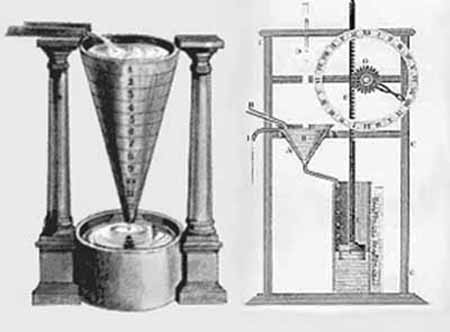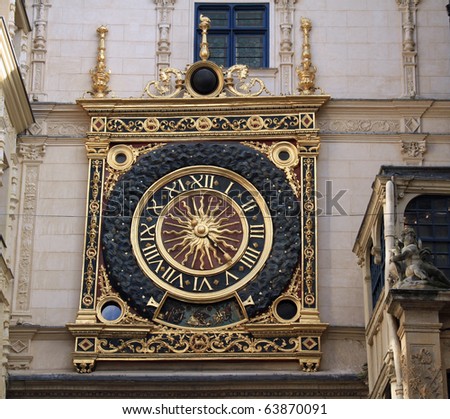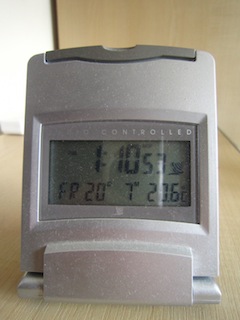Secondary Research
Source:
http://news.softpedia.com/news/Top-10-Greatest-Inventions-Ever-50819.shtml
Some inventions mentioned on this website are:
- Telescope
- Computer
- Television
- Automobile
- Electricity
- Telephone
- Antibiotics
- The Printing Press
- The Clock
- The Toilet
Some of these inventions are defined as the best because they have furthered the knowledge of mankind and the understanding of the universe such as the telescope allowing us to see how the universe works, the computer allows us to communicate with the rest of the world, the printing press helped to make more people literate and antibiotics have saved lives.
I am more interested in the inventions that you wouldn't think of but would make a massive impact on your life if they were suddenly removed such as the clock and the toilet!
I will research further into these fields because I know nothing about them and they are the interesting underdogs of the best inventions ever!
The Clock
"Time was actually a measure of events before the timepiece was invented, the main one being the Sun crossing the sky.
No universal time actually existed, only a local one."
I am interested in the clock because modern society couldn't exist without it but we've grown so
accustomed to it that it is hugely taken for granted. And clock faces look really good.
The clock is one of the oldest inventions beginning with sundials, one of which dates back to 800 BC
Egyptian Portable Sun Dial:
Along with the sundial the egyptians invented the 'water clock' as a way of more precisely measuring time as the suns path through the sky changes with the seasons and is reliant on the weather. The water clock measures the amount of drops to fall into a tube which gives a reading of time. This is one of the oldest recorded water clocks found in an Egyptian tomb, on the right hand side of the image you can see the beginnings of a clock face and hand that gets pushed around as the water level rises in the cylinder.

Various other non-mechanical methods of measuring time exsisted up until around 1200AD when clockwork began to be developed.
"A textbook on astronomy, written by 'Robert the Englishman' in 1271, says that 'clockmakers are trying to make a wheel which will make one complete revolution' in each day, but that 'they cannot quite perfect their work'."
By the 14th Century perfect timekeeping had been perfected with this clock:

From this the mechanisms have been made more compact to come to todays watch which first appeared in the 17th Century:

Wrist watches became popular in the 1920's, before this the pocket watch was the most common.


1920's Wristwatches:

1940's
1960's

The Digital Clock
The first digital clock as we know it was patented in 1956 and became available and relatively popular around 1970, however they were expensive and only became popular with the public in the late 70's and 80's.
1980's

Various Clock faces:

Primary Research
Photographs
An interesting fact related to time I heard whilst watching some rubbish breakfast television was the derivation of the days of the week!
The days of the week were named by the Greeks after their Gods, the same system was adopted by the Romans and the Germanic Peoples but with their own God's in place of the Greek Gods, the system we use was the Germanic peoples:
Sunday-The Sun's Day
Monday- The Moon's Day
Tuesday- Tiu's Day (God of War)
Wednesday-Woden's Day
Thursday- Thor's Day (God of Thunder)
Friday- Freya's Day
Saturday- Saturns Day
The Toilet
Another invention that is integral to modern society is the toilet!
There are many different incarnations of the toilet from different regions of the world.
Early toilets consist of pots and holes in the ground however the sophistication of toilets differs depending on region, there is evidence of a primitive WC and sewage system in India from over 4000 years ago. The romans used toilet times as a social opportunity, using big communal toilet areas to chat and get rid of waste!
The invention of the toilet as we know it today is accredited to Sir John Harrington, who invented a flush toilet in 1596 but didn't get fully developed until 1775 when Cummings invented the modern toilet and 'S-Bend'
"A watchmaker called Alexander Cummings invented the first modern flushing toilet in 1775"
Roman toilets:

It is interesting how the design of the toilet changes around the world today:
This website has some great examples!:
http://blog.hostelbookers.com/travel/free-things-to-do/toilets-of-the-world/
Toilet by
Monica Bonvicini outside the Tate Modern made out of one-way mirror!



a very welcoming toilet ( apparently it is trying to stop the user from putting any paper down the toilet)



http://funny-home.com/pictures/funny_pics/827-the-strangest-toilets-ever-53-pics.html




It is interesting finding out where the slang we use for toilet related things come from
Derivations of toilet slang:
LOO
Some say that it comes from Europe where the toilet was commonly found in 'Room 100' of big buildings and the '100' got misconstrued into 'loo' at some point, others think that it comes from French when people emptied their chamber pots out of their windows and shouted "Gardez l'eau" and the l'eau part has been changed into 'loo'
Spend A Penny
THis phrase comes from the 1850's when coin operated cubicles were put in place that cost 1p to use.
Slang for urination:
- Talking to grandma slowly
- To go and spend a penny
- Answer the call of nature (or nature's call)
- Beating the piss out of the little guy
- Blasting the beast
- Bleeding the lizard
- Breaking the seal
- Change water on the goldfish
- Coffee dump
- Do a wee
- Draining the dragon
- Draining the main vein
- Draining the radiator
- Draining the one-eyed monster
- Draining my rpg
- Draining down the system
- Expel urine from my sack of pee (VGCats Webcomic [1])
- Flush my buffers
- Freshen my Snapple
- Go pee pee
- Going to water my horse
- Hosing the porcelain
- Humping the cat loin
- Leak the lizard
- Let er' fly
- Lift leg (used commonly among members of the furry fandom, derived from how male canines urinate)
- Lower the water level
- Make one's bladder gladder
- Number one
- Parking my breakfast
- Pass water
- Paying the water bill
- Pee
- Pwenk (very rare)
- Pee Pee
- Piddle (considered a coarse expression in some quarters)
- Piss
- Pit stop
- Point Percy at the Porcelain
- Point the Pink Pistol at the Porcelain Firing Range
- Pointing Percy at the porcelain
- Punish the porcelain
- Putting out the fire
- Raining on the bowl
- Release the pressure
- Refresh the body
- Relieve yourself
- See a man about a horse
- Shaking hands with the president
- Shaking hands with the vicar
- Shaking hands with the wife's best friend
- Shaking the dew off the lily
- Soaking yourself
- Splashing the pirate
- Spend a penny
- Sprinkle
- Sprinkle my tinkle
- Squirt
- Steering Stanley to the stainless steel
- Syphon the python
- Taking a leak
- Taking a pee
- Taking a piss (considered a coarse expression in some quarters)
- Taking a slash
- Taking a squirt
- Taking a whiz`z
- Tapping a kidney
- Tinkle
- Training Thomas on the terracotta
- Troggle
- Twinkle
- Visit Uncle Charley
- Visit the urination station
- Void my bladder
- Walk my snake
- Wash my mongoose
- Water my weasel
- Watering the flowers (outdoor)
- Write my name in the water
- Write my name in the snow
- Take a wicked "Yes" (Family Guy; Peter Griffin in French class after hearing the words, Oui Oui)
- Having a slash
- Take a Chinese singing lesson
An Informative Timeline of toilets! : http://www.edinformatics.com/inventions_inventors/flush_toilet.htm
Interesting and innovative inventions!
http://www.toxel.com/tech/2010/06/24/12-brilliant-and-useful-inventions/
Primary research from the York Castle Museum:
Complete with fake poo
I could also look into different variations of toilet signs from around the world:
Outside the box thinking:

This documentary looks into parts of India and Indonesia where more than half the population do not have a toilet and what effect this has on health, sanitation and living conditions
At the end of the documentary a man who's aim it is to get everybody in the world access to a toilet says that the toilet is much more than what we would think of it, it represents quality of life, affects your entire wellbeing and emotional health.
More Research
So far the Useful Inventions path has been the most interesting so I am going to focus on this path and research further into some inventions that I want to learn more about and that I think are interesting. Some inventions I could look into are:
- Motherboard*
- Keyboard
- Mouse
- Batteries
- Shoes
- Kettle
- Fire
- Teabags
- Chairs
- Bikes
- Pharmaceuticals*
- Cheese Graters
- Television
- Internet
- Carpetting
- Laminate flooring
- Names
- Mugs
- Cutlery
- Crockery
- Vases
- Decorations
- Footwear
- Clothing
- Toothbrushes*
- Cameras
- Music format
- Musical Instruments
- Wallpaper
- Sweets
- Children's Toys*
- Magazines
- Media
- Buttons
- Zips
- Household Pets
- Currency*
- Letters
- Seasonings*
- Condiments
- Drinks
Out of this list the ones that I think will have the most substance and interest are: Motherboard, Pharmaceuticals, Toothbrushes, Children's Toys, Currency and Seasonings.
To start with I am going to focus on Children's toys and Pharmaceuticals
Children's Toys
In the York Castle Museum I came across these 2 toys that caught my eye due to how weird and disturbing they are:
I especially like this weird dog goblin that's playing the violin:
Secondary Resource:
Medicine
These 2 links give a basic overview of timelines of medicine.












































